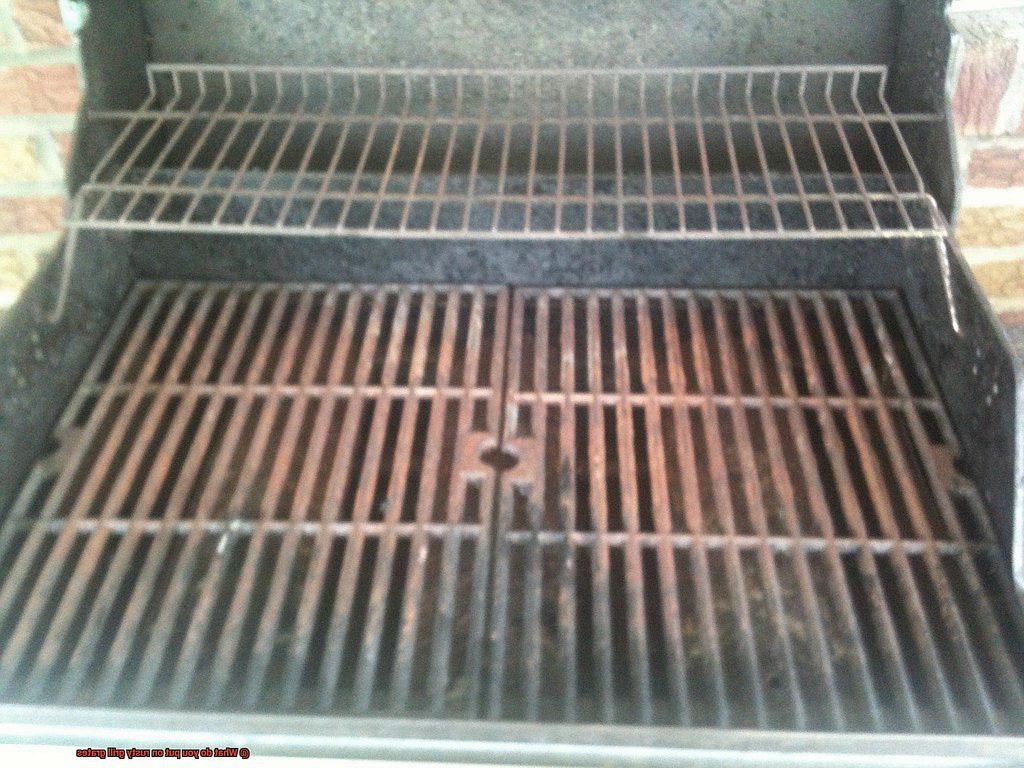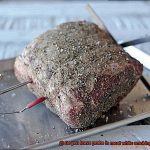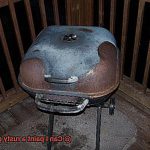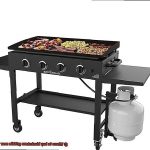Picture this: it’s a warm summer evening, and you’re hosting a backyard BBQ. You can hear the sizzling sound of meat cooking on the grill, smell the charred aroma wafting through the air, and see smoke rising from the coals. It’s a quintessential American experience that brings people together. But when you open up your grill after a long winter, rusty grill grates can be quite discouraging. Not only do they look unpleasant, but they can also affect the taste of your food.
To make sure your next BBQ is a success, cleaning rusty grill grates is essential before using them for cooking. You can’t just rely on high heat to kill bacteria and germs on dirty grates. Plus, rusty surfaces can cause harmful chemicals to leach into your food – definitely not what you want. But don’t worry – you don’t have to spend a lot of money on expensive grill-cleaning products to get the job done.
There are plenty of natural and household items that you can use to clean rusty grill grates. From baking soda and vinegar to commercial grill cleaners and wire brushes, we’ll explore all the best solutions for restoring your rusty grill grates. So fire up your grill (once it’s clean.) and let’s get started.
Contents
What Causes Rusty Grill Grates?
Rusty grill grates can put a damper on any summer barbecue. However, understanding the root causes of this pesky problem is the first step in preventing it from happening. So, what really causes rusty grill grates? Let’s take a closer look.
Moisture is the primary culprit behind rust formation on grill grates. When metal surfaces are exposed to water or moisture, they react with oxygen in the air and start to oxidize, leading to rust. To prevent this from happening, it’s essential to keep your grill covered when not in use and store it in a dry place.
Heat can also contribute to rust formation on grill grates. When the metal surface expands and contracts due to heat, cracks and crevices can form, allowing moisture to penetrate. To prevent this, make sure to clean your grill grates after each use and remove any debris that could trap moisture.
Additionally, the type of metal used in making grill grates can impact their susceptibility to rusting. While cast iron and steel are common materials used for grill grates, both are prone to rust if not properly cared for. On the other hand, stainless steel is less likely to rust but still requires proper maintenance.
Now that you know the causes of rusty grill grates, how can you prevent them? Here are some helpful tips:
- Keep your grill covered when not in use and store it in a dry place.
- Clean your grill grates after each use with a specialized cleaner designed for rusty grill grates.
- Remove any debris that could trap moisture.
- Soak your grates in a mixture of vinegar and baking soda or use a paste made from lemon juice and salt.
- Apply a protective coating of vegetable oil or cooking spray before storing your grill.
Wire Brush Method for Removing Rust
As a grill master, you know that rust buildup on your grill grates can be a real buzzkill. But fear not. The wire brush method is a tried-and-true way of removing rust and debris from your grates, leaving them looking shiny and new.
To begin, start by heating up your grill to a high temperature. This will help loosen any buildup that has accumulated on the grates. Once the grates are hot, turn off the heat and let them cool down for a few minutes before proceeding.
Now, it’s time to grab your trusty wire brush. Look for one with stiff bristles that can withstand the heat of the grill and effectively scrape away rust and debris. A long-handled brush is also recommended for maximum reach and coverage.
Don’t forget to protect your hands with gloves during the brushing process. Using a wire brush specifically designed for use on grill grates is also important, as other types of brushes may not be effective or could even cause damage.
Next, get to work scrubbing away any loose rust or debris on the grates with your wire brush. Take care not to damage the grates or leave any scratches behind. It may take some elbow grease, but it’s worth it for those perfectly grilled burgers and steaks.
After using the wire brush method, rinse off the grates with water and dry them thoroughly before using the grill again. This final step helps to remove any remaining debris and ensures that your grates are clean and ready to use.
To prevent future rust buildup on your grill grates, remember to clean them after each use, store them in a dry place, and consider applying protective coatings like vegetable oil or cooking spray.
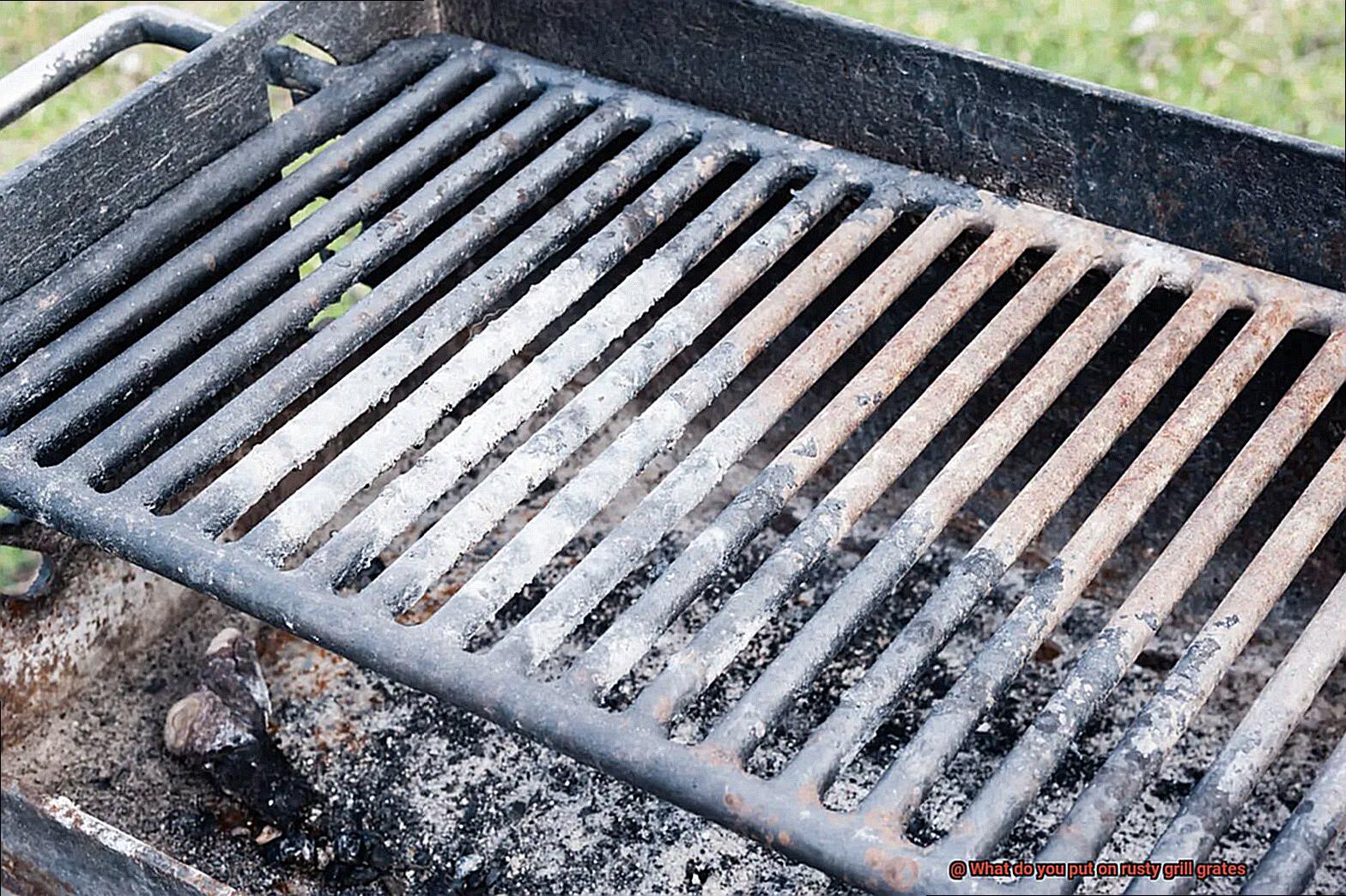
Specialized Cleaners for Rusty Grill Grates
Look no further than specialized cleaners. These powerful products have been designed specifically to remove rust and tough stains from metal surfaces, like your grill grates. Let’s take a closer look at the different types of specialized cleaners available.
Acid-based cleaners are a popular option, thanks to their ability to dissolve rust and other stubborn stains on grill grates. These cleaners contain ingredients like phosphoric acid or hydrochloric acid, which break down rust and make it easier to remove. Just be sure to use caution and follow the manufacturer’s instructions carefully, as these cleaners can be dangerous if not handled properly.
Enzymatic cleaners are another type of specialized cleaner that can work wonders on rusty grill grates. These natural cleaners break down organic matter like grease and food residue, which can lead to rust buildup. Enzymatic cleaners come in various forms, including sprays and soaking solutions. Plus, they’re safe to use around food.
For those tough-to-remove rust spots, abrasive cleaners may be the best bet. These powders contain small particles that scrub away rust and other stains on grill grates. However, it’s important to use caution when using abrasive cleaners, as they can scratch the surface of the grill grates if not used correctly.
Natural Remedies for Removing Rust
Say goodbye to harsh chemicals, and try these natural remedies. As an expert in rust removal, I have researched and compiled a list of five effective and affordable options.
The first remedy is mixing equal parts of baking soda and water to create a paste. Apply the paste to the rusted areas of your grill grates and let it sit for 30 minutes. Scrub the grates with a wire brush and rinse with water.
Next, soak your rusted grill grates in white vinegar for several hours or overnight. Remove the grates from the vinegar and scrub them with a wire brush. Rinse with water.
For a citrusy twist, cut a lemon in half and squeeze the juice onto the rusted areas of your grill grates. Sprinkle salt over the juice and let it sit for at least two hours. Then, scrub with a wire brush and rinse with water.
Another option is using a potato and dish soap. Cut a potato in half and dip it in dish soap. Rub it over the rusted areas of your grill grates, applying pressure as needed. Rinse with water after use.
Finally, pour Coca-Cola over the rusted areas of your grill grates and let it sit for at least 30 minutes. Scrub with a wire brush and rinse with water.
Prevention is key in avoiding rust buildup on grill grates. After each use, clean your grill grates thoroughly and store them in a dry place to prevent moisture buildup.
Advantages and Disadvantages of Using a Wire Brush
As grilling season approaches, it’s essential to ensure that your grill grates are clean and free of rust, grime, and debris. One popular tool for cleaning grill grates is a wire brush, but it’s crucial to understand the advantages and disadvantages before using one. As an expert in this topic, let me break it down for you.
Advantages:
Wire brushes are highly effective in removing rust, grime, and other debris from grill grates. They can easily scrub away any unwanted buildup, leaving your grates looking shiny and new. Additionally, wire brushes are relatively inexpensive compared to other grill-cleaning tools. They are also durable and typically made of tough materials like stainless steel that can withstand tough cleaning jobs.
Disadvantages:
While wire brushes have their benefits, there are also some potential drawbacks to consider. One major disadvantage is that they can damage the grill grates if used improperly or with too much force. This can lead to potential food contamination and safety hazards. Another potential danger is that the bristles on wire brushes can break off and get stuck in food, leading to serious health risks if ingested. Lastly, wire brushes may not be suitable for all types of grill grates – porcelain-coated or non-stick grates can be scratched or damaged by wire brushes.
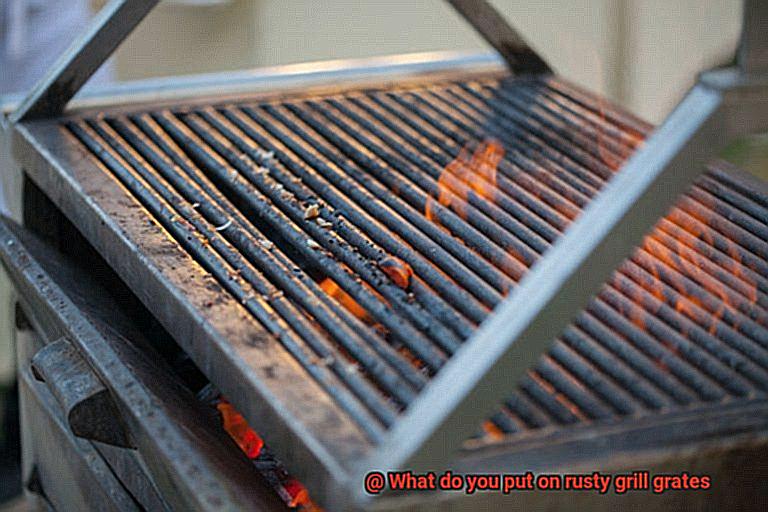
Alternatives:
If you’re concerned about the potential risks associated with using a wire brush, there are alternative methods for cleaning your grill grates. You may want to consider natural remedies like creating a baking soda paste or soaking in white vinegar. These options are safe and effective alternatives that do not pose the same risks as using a wire brush.
Advantages and Disadvantages of Using a Specialized Cleaner
Using a specialized cleaner may be the answer, but before you decide, let’s explore both the advantages and disadvantages.
Advantages:
Firstly, specialized cleaners are specifically designed to remove even the toughest rust and grime that accumulates on grill grates. This means that you don’t need to worry about damaging the metal. Secondly, they are incredibly easy to use. Most come in spray bottles, which makes application a breeze. Simply spray the cleaner on the grates, let it sit for a few minutes, and then wipe it off with a cloth or brush. The fast-acting formula of specialized cleaners means that your grill grates will be clean in just a few minutes.
Disadvantages:
Specialized cleaners often contain chemicals that could be harmful if ingested or inhaled. If you’re concerned about using chemicals around your food, you may want to consider a safer alternative cleaning method. Additionally, specialized cleaners can be more expensive compared to other cleaning methods like using baking soda or vinegar. If you’re on a tight budget, this may not be the best option for you. Lastly, some specialized cleaners may have an impact on the environment if not disposed of properly. This is why it’s essential to consider eco-friendly alternatives if you’re concerned about your environmental impact.
Advantages and Disadvantages of Using Natural Remedies
Let’s start with the advantages. Natural remedies are a popular option among many grill enthusiasts because they are environmentally friendly, safe for food, cost-effective, and readily available. Unlike chemical cleaners, natural remedies are made from biodegradable ingredients that don’t harm the environment.
This means that you can clean your grill grates without worrying about polluting the environment. Moreover, natural remedies are safe to use on surfaces that come into contact with food, so you don’t have to worry about harmful chemicals contaminating your food.
Plus, they are cheaper than chemical cleaners and made from everyday household items like vinegar, baking soda, and lemon juice, which are readily available in most homes.
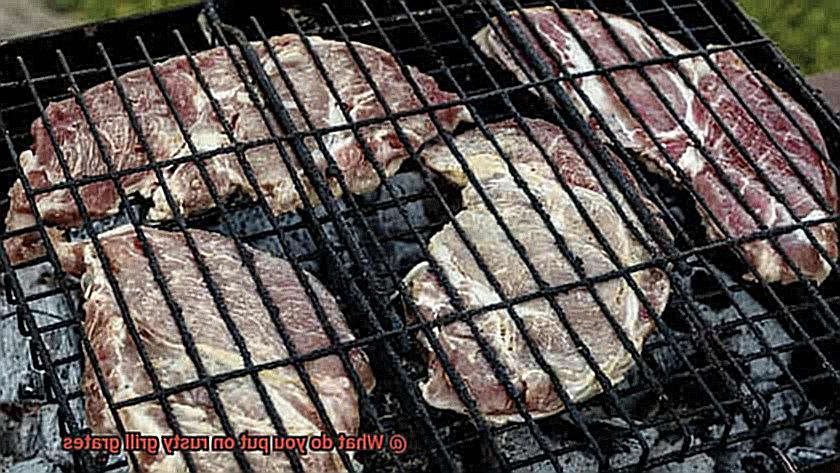
However, there are some disadvantages to consider before using natural remedies. First of all, they may not be as effective as chemical cleaners in removing stubborn rust stains from grill grates. This could be frustrating if you’re looking for a quick and easy solution. Secondly, natural remedies may take longer to clean rust stains compared to chemical cleaners, requiring more time and effort to get the job done. Finally, they may have a limited shelf life compared to chemical cleaners, which can last for several years when stored properly.
Now that you know the advantages and disadvantages of using natural remedies to clean rusty grill grates, it’s up to you to decide which option works best for you. If you’re looking for an environmentally friendly and cost-effective option that’s safe for food and readily available at home, then natural remedies might be the way to go. However, if you need a quick and effective solution for stubborn rust stains and don’t mind using chemical cleaners, then they might be a better option.
Tips for Properly Cleaning Rusty Grill Grates
Rusty grill grates can put a damper on your outdoor cooking plans, but there are ways to properly clean them and get your grill back in top shape. Here are five tips for properly cleaning rusty grill grates:
Clean Regularly to Prevent Rust Buildup
Prevention is key when it comes to rust buildup on your grill grates. Always clean them after each use with a wire brush or grill brush to remove any food particles or debris.
Use a Vinegar Solution for Rust Removal
If your grill grates are already rusty, try using a vinegar solution. Mix equal parts water and vinegar in a spray bottle and spray the solution onto the rusty areas of the grates. Let it sit for at least 30 minutes before scrubbing with a wire brush.
Try Baking Soda for Stubborn Rust
For particularly stubborn rust, use baking soda. Mix baking soda with enough water to form a paste and apply it to the grates. Let it sit for about 15 minutes before scrubbing with a wire brush or grill brush.
Use Commercial Rust Removers Carefully
Commercial rust removers designed for metal surfaces like grill grates can also be used, but make sure to follow the instructions carefully.
Properly Season Your Grates After Cleaning
After cleaning your grill grates, it’s important to season them properly to prevent future rust buildup. Rub a thin layer of oil onto the grates and heat them on high for about 20 minutes before letting them cool completely.
nS6GgHR5v_8″ >
Also Read: Can You Paint Grill Grates?
Conclusion
In conclusion, rusty grill grates are a no-go when it comes to cooking up your favorite BBQ dishes. Not only do they look unsightly, but they can also taint the taste of your food and even pose health risks by leaching harmful chemicals into your meals. Luckily, there are several solutions for restoring rusty grill grates and ensuring they’re safe for use.
Moisture and heat are the primary culprits behind rust formation on grill grates. However, proper maintenance and storage can prevent this from happening. Regular cleaning is key to keeping rust at bay, so be sure to clean your grill grates after each use.
When it comes to removing rust from grill grates, natural remedies like baking soda, vinegar, lemon juice, salt, potatoes, and even Coca-Cola can work wonders. These household items are cost-effective and safe for food consumption. However, if you’re dealing with stubborn rust stains or buildup, specialized cleaners designed for rusty grill grates may be necessary.
It’s important to exercise caution when using commercial rust removers as they may contain harmful chemicals that could be dangerous if not handled properly. Wire brushes are a popular tool for cleaning grill grates but should be used gently to avoid damaging the surface.
Properly seasoning your grill grates after cleaning is crucial in maintaining their longevity and preventing future rust buildup.

